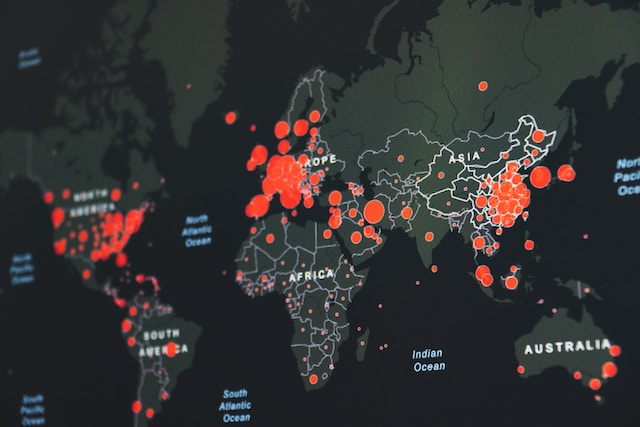Introduction
Global crises have one common feature – they are not innocuous. Covid-19, climate change, and poverty all have harmful features and are not benign occurrences. Nevertheless, they may produce learning moments, such as providing an opportunity for a moral reassessment of norms, laws, and practices in human society. Covid-19 is a case in point: a pandemic so destructive that it led to a loss of lives around the world and effectively brought human and societal progress to a halt. The pandemic set the world back to ancient times, characterised by fear and uncertainty, dramatised in instances such as the frantic rush by people in supermarkets to stock up on household essentials. Masks and other personal protective equipment became familiar sights. Although Covid-19 is no longer a global health emergency, remnants of when people had to maintain social distance from loved ones and strangers remain. Some events after vaccines for the disease were developed and manufactured raised questions that merit consideration. One of those questions concerns the global distribution of Covid-19 vaccines.
Vaccine Nationalism and the Question of Equitable Distribution
The development and consequent production of Covid-19 vaccines quickly led to the problem of fairly and equitably distributing those vaccines to every part of the world. Some high-income countries committed vast sums of money to Covid-19 vaccine research and development. In this instance, the UK appeared to lead – the Oxford/AstraZeneca vaccine received significant support from the UK government and charitable trusts. Many high-income countries eventually secured ample supplies of vaccines for their populations, sometimes more than was necessary to vaccinate all citizens. Developing countries were effectively left in the lurch. They were at the receiving end of vaccine nationalism. They relied mainly on global vaccine initiatives such as the Covid-19 Vaccines Global Access (COVAX) to distribute vaccines needed to reduce the incidence of the pandemic. When India and South Africa advanced a proposal before the World Trade Organisation (WTO) to waive existing patents and intellectual property rights concerning Covid-19 drugs, vaccines, and diagnostics, their effort was rebuffed by mainly developed countries that have routinely argued that patent waivers would dis-incentivise innovation. The proposal would have enabled developing countries to manufacture Covid-19 vaccines and drugs, thereby helping to boost global supply. The WTO would later announce a compromise deal that aimed to waive patents related to Covid-19 vaccines. Nevertheless, some organisations argued that this compromise was inadequate.
African Communitarianism
The inequitable and unfair distribution of Covid-19 vaccines is an opportunity to reassess the international order’s ethical principles. Principles that would prevent a reoccurrence of the problem should be entrenched. These principles could also help address other global crises, such as climate change, economic inequality, etc. Neoliberalism, the dominant philosophical principle that underpins much of the international order is unsuited for global crises. This is especially the case when those crises concern the distribution of resources. African communitarianism could provide a viable substitute.
African communitarianism is the subject of multiple interpretations, but one commonality among these interpretations is the emphasis on interconnectedness. Parochial interests are de-emphasised in African communitarianism. In one interpretation of the philosophical concept, African communitarianism is said to elevate communal interests over personal interests. Since the person is not a solitary figure in the community, it follows that the community has a role in making the individual a person. In other words, there is a dialogic relationship between an individual and their community. Another interpretation of African communitarianism prizes harmonious and communal relationships among members of a socio-political community through the ideals of identity and solidarity. Members share a recognition of the other’s plights and render assistance where this is needed. This relational reading also means that individuals have a duty to the community. It is equally important to understand that African communitarianism is compatible with human rights, respecting an individual’s right to flourish. The philosophical concept is particularly suited for global crises because of its main emphasis on the theme of interconnectedness. Our existence as members of the international community is inextricably linked.
Postscript
If the response to Covid-19 had been underpinned by values salient within African communitarianism, it may have produced a different outcome. High-income countries may have considered it a moral obligation to assist low-income countries to overcome the problem posed by the inequitable distribution of Covid-19 vaccines. They would likely not have opposed the proposal to waive patents and intellectual property rights related to Covid-19 vaccines and drugs because sharing technology on Covid-19 vaccines would be the right thing to do. It is admitted that all these may appear idealistic amidst self-interest and other neoliberal principles that dominate international affairs today. Nevertheless, there is a need to reassess the world’s ethical foundation and entrench philosophical principles that will enable the world to navigate through some of the pressing global problems of this century.

3 replies on “Global Crises and the Reassessment of the World’s Ethical Foundation: Lessons from African Communitarianism ”
Interesting read!
Well done Chitzi.
Interesting read. I particularly like how you have proposed using the concept for achieving global justice.
Well done Chitzi!!!
This insightful discourse prompts consideration of the profound theme of interconnectedness, evoking parallels with the philosophical concept of Ubuntu. Your articulation of ideas demonstrates an enrichment of understanding. One is compelled to reflect on the interconnected nature of knowledge – Go, Chitzi, go Chitzi, go!